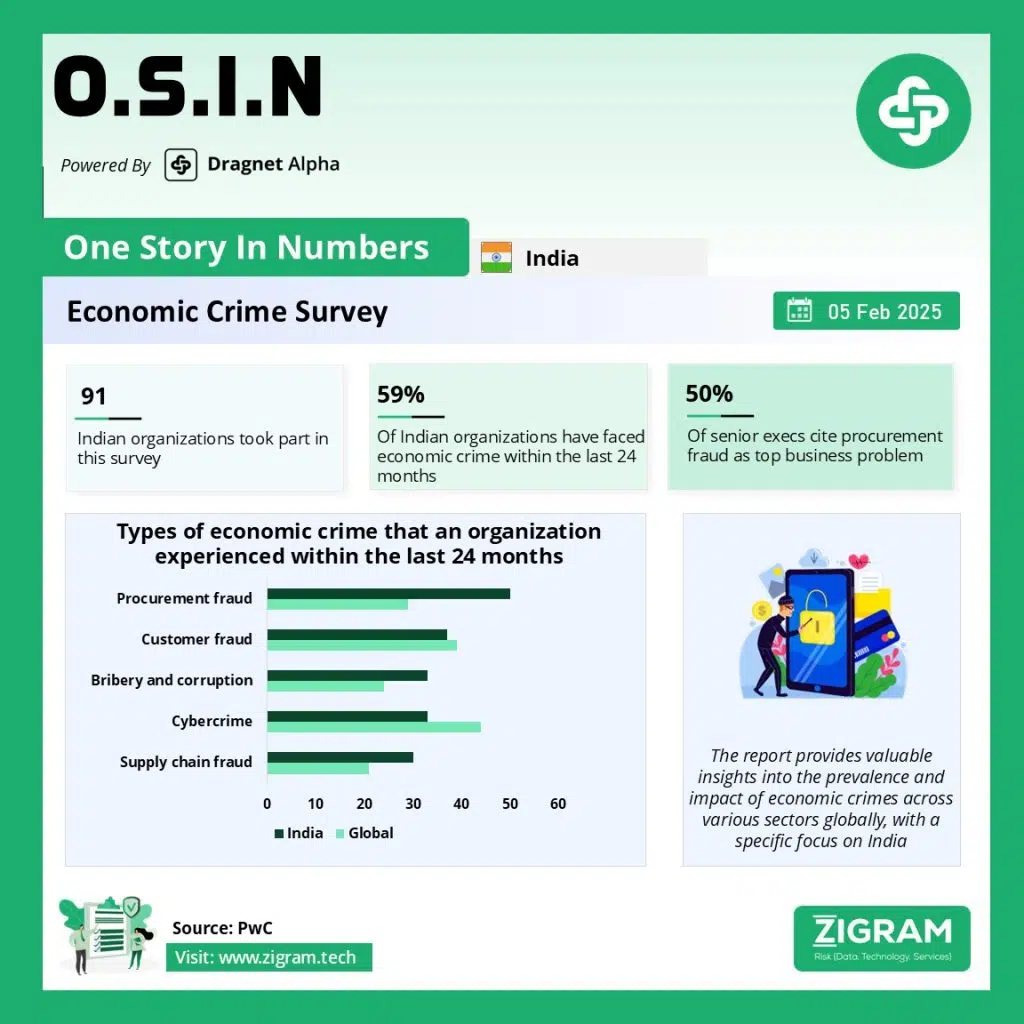Economic Crime Survey in India: A Growing Challenge for Businesses
In an increasingly interconnected world, businesses face a dual reality: opportunities often come hand-in-hand with risks. While the free flow of capital, goods, and services across borders creates growth prospects, it also exposes organizations to significant challenges, particularly economic crime.
Economic Crime: A Persistent Threat
Economic crime remains a persistent and pervasive challenge for businesses globally. As companies expand into new markets, they face heightened risks of bribery, corruption, and fraud. Geopolitical conflicts, such as those in Europe and West Asia, have further complicated the landscape by disrupting supply chains and intensifying risks related to sanctions and export controls. Additionally, concerns over forced labor, environmental, social, and governance (ESG) responsibilities, and the use of third parties in long supply chains have added layers of complexity to risk management. For businesses, mitigating these risks intelligently is no longer optional—it is imperative for sustainable growth
India’s Economic Crime Landscape: A Higher Perception of Risk
In India, the survey included responses from 91 organizations across diverse sectors such as consumer products and retail, industrial and manufacturing, automotive, technology, and healthcare. The findings revealed that Indian executives perceive economic fraud as a more significant threat compared to their global counterparts.
• 59% of Indian executives reported that their companies had experienced some form of financial or economic fraud in the past 24 months, compared to 41% of global executives.
• This heightened perception of risk underscores the need for Indian businesses to adopt proactive measures to combat fraud and ensure compliance.
The Rise of Procurement Fraud in India
One of the most striking findings of the survey is the growing prevalence of procurement fraud in India. Procurement fraud, which involves the illegal manipulation of the procurement process for financial gain, has emerged as the top economic crime concern for Indian businesses in 2024.
• In the 2022 survey, customer fraud (e.g., mortgage, credit card, and cheque fraud) was the most reported economic crime, cited by 47% of Indian companies.
• However, in the 2024 survey, procurement fraud has surpassed customer fraud, with 50% of Indian respondents identifying it as a major concern.
• Notably, 39% of Indian executives described procurement fraud as the most disruptive economic crime affecting their businesses.
Understanding Procurement Fraud
Procurement fraud is one of the oldest forms of economic crime, affecting businesses of all sizes. It can occur at any stage of the procurement process—from bidding to the delivery of goods and services—and can take various forms, including:
1. Inflated or Fake Invoices: Submitting invoices for goods or services that were never delivered or at inflated prices.
2. Buyer-Supplier Collusion: Undisclosed conflicts of interest, such as relationships between employees and vendors, leading to biased decisions.
3. Specification Manipulation: Altering the specifications of goods or services to favor a particular bidder in exchange for kickbacks.
These fraudulent activities are often difficult to detect, making procurement fraud a particularly insidious threat.
Mitigating Economic Crime: A Call to Action
The findings of the survey underscore the need for businesses to adopt comprehensive strategies to mitigate the risks of economic crime. Key steps include:
1. Strengthening Internal Controls: Implementing robust checks and balances to detect and prevent fraudulent activities.
2. Leveraging Technology: Using advanced tools such as data analytics and artificial intelligence to identify suspicious patterns and anomalies.
3. Enhancing Governance Frameworks: Ensuring transparency and accountability in procurement processes and third-party relationships.
4. Employee Training: Educating employees about the risks of economic crime and the importance of ethical behavior.
Conclusion
The survey highlights the evolving nature of economic crime, particularly in India, where procurement fraud has emerged as a significant and disruptive threat. As businesses navigate an increasingly complex global landscape, mitigating these risks intelligently is crucial for sustainable growth. By adopting proactive measures and fostering a culture of compliance, organizations can safeguard themselves against economic crime and build a foundation for long-term success.
Read the full report here.
Please read about our product: Dragnet Alpha
Click here to book a free demo
- #IndiaBusiness
- #GlobalCrimeSurvey
- #RiskManagement
- #CorporateGovernance
- #AntiCorruption
- #CyberSecurity
- #ComplianceMatters
- #BusinessEthics
- #FraudAwareness
- #ESGRisks
